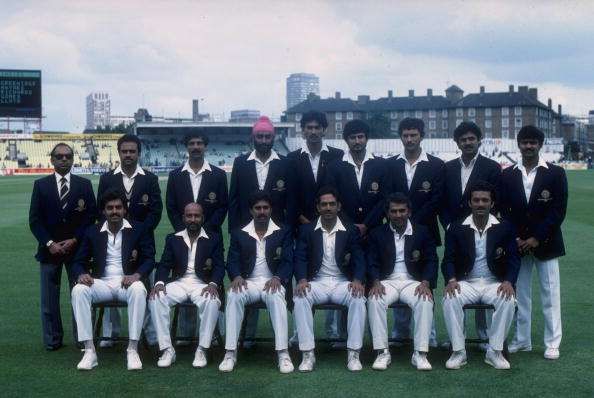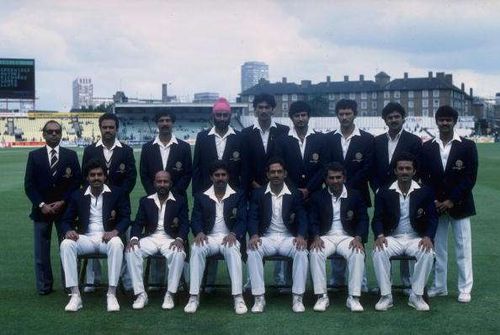
India's 1983 World Cup Champions XI: All you need to know about them
Back in 1983, when India winning the World Cup was just seen as a far-fetched dream, the national team marshalled by Kapil Dev brought home the glorified trophy, showing the world why they deserve to be called the champions. Lifting the cup at Lord's, the abode of cricket, was not the only reason to celebrate, but the victory was against Clive Lloyd's invincible West Indies, one of the most feared pack of the time.
India did stun the entire world with the victory, as their solitary victory in the previous two World Cups was only against East Africa, and the team defeating the previous world champions was termed as an "upset" by many.
Kapil Dev: Rated one of the greatest cricketers of all time, Kapil Dev's achievements soared after winning the World Cup. The legendary all-rounder, who is responsible for revamping the face of Indian cricket in that era, led the team from the front, finishing with 303 runs at an average of 60.6, 12 wickets and a total of seven catches in eight matches. The evergreen picture of the smiling 24-year old captain lifting the cup remains etched in every Indian's memory.
One of the masters to have played the game, the Chandigarh-born kingpin was appointed as the coach of the Indian national side in 1999, but resigned after the betting controversy. In 2008, he joined the Indian Territorial Army as an honorary officer and was commissioned as a Lieutenant Colonel .
Mohinder Amarnath: The vice-captain of the team during the World Cup, Mohinder Amarnath was the Man of the Series in the tournament for his stellar performances in the final and the semi-final. With his fine all-round skills, he put on a steady 26 runs and picked three wickets, giving away just 12 runs in the seven overs he bowled in the final.
Respected for his on-field temperament, the Caribbean great Vivian Richards once called him "one of the nicest men to have ever played the game."
Kirti Azad: The all-rounder, who was a surprise inclusion in the Indian team touring Australia in 1980-81, failed to impress in that tournament and was ignored till he was picked to play in the 1983 World Cup. Known for his slightly fast off-breaks, his dismissal of Sir Ian Botham during the semi-final earned him a bonus as the great batsman had failed to read the ball.
Azad ended with figures of 1/28 after bowling 12 overs and was instrumental in taking India to the final. He ventured into politics after cricket and is currently serving his third term in the Lok Sabha.
Roger Binny: The veteran all-rounder from Karnataka is known for his explosive batting and his formidable spells and has been a match-winner for the team on several occasions. He was the leading wicket-taker in the 1983 World Cup, picking 18 wickets in eight matches, at an economy rate of 3.81. He crushed Australia with his four-wicket haul at Chelmsford in one of the group stage matches, which India won by 118 runs.
Binny was made the coach of the India U-19 team who won the World Cup in 2000. Later serving as the coach of Bengal and as a member of the Karnataka State Cricket Association, Binny was inducted as one of the national selectors in 2012.
Sunil Gavaskar: The lynchpin of India's batting in the 70s and 80s, Sunil Gavaskar is regarded as one of the greatest openers of all time, though the right-hander's luck in the 1983 World Cup was minimal. In that era, he became the first batsman to cross the 10,000 runs barrier in Tests and also had the most number of Test centuries to his name – a record which was broken by fellow countryman Sachin Tendulkar two decades later.
Post retirement, he turned to commentating, and the diminutive batsman has also served as BCCI’s interim president in March 2014.
Syed Kirmani: The Chennai-born cricketer, who batted in the lower-order was one of India's most reliable player back in the 80s. He was named the best wicket-keeper in the 1983 World Cup for showcasing his remarkable skills behind the stumps, one of the highlights being the catch of Faoud Bacchus in the final against West Indies.
During the match against Zimbabwe in the first round of the tournament, he effected three catches and two stumpings and equalled the then record. In the same match, he provided a strong stand for Kapil Dev during the latter's iconic 175 not out against the African opponents, putting on a 126-run ninth wicket partnership.
He was made the chairman of India's selection committee in early 2000s.
